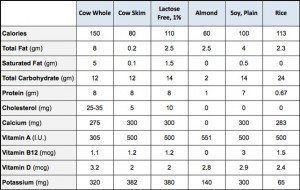Do you drink milk? That's a pretty easy question because it doesn't specify what kind of milk? Most people assume you mean cow's milk but nowadays that question can be open to interpretation as the regular variety or one of rice, almond or soy. So what's the difference between the different types of milk? And more importantly is there one type that you should be drinking? Below is a table that summarizes the key nutritional differences between the various types of milk. Let's take a look at each. [caption id="attachment_3527" align="alignleft" width="300"] Nutritional data of different kinds of milk Almond MilkThis is made by crushing almonds with water and as it is not produced with animal products it has little to no saturated fat or cholesterol. Compared to cow's milk it has as little as 40% of the calories and does not contain the sugar lactose. However when drinking almond milk you lose much of the protein, calcium and vitamin B12 found in cow's milk. Soy MilkThis milk is made with soybeans and water and is also produced without animal products therefore is has little saturated fat and no cholesterol. In terms of calories it is comparable to some forms of cow's milk and is almost double the energy of almond milk. In terms of the protein content soy has slightly less than cow's milk and is comparable in terms of the vitamin and mineral content. Rice MilkAny guesses how rice milk is produced? As with the other two varieties it is made by combining rice (usually brown) with water. Since this form of milk is made from a starch it has a higher carbohydrate content and the highest calorie content of non-dairy types of milk. Again as with the other 2 non-dairy varieties this is a non-animal form of milk so the...
